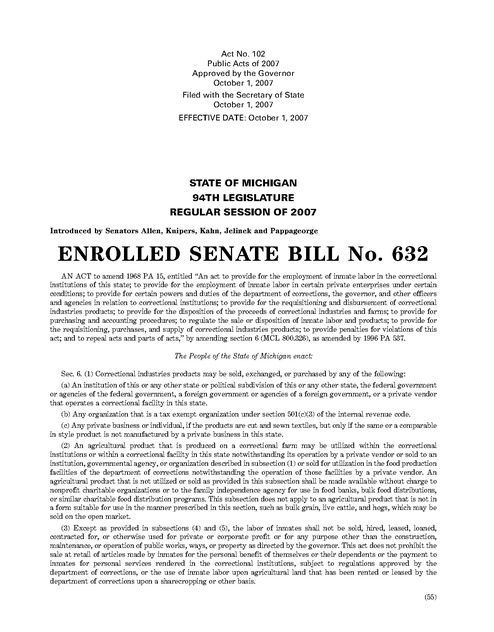MI Senate Bill 632 Expanding Prison Industries Enacted, MI State, 2007
Download original document:

Document text

Document text
This text is machine-read, and may contain errors. Check the original document to verify accuracy.
Act No. 102 Public Acts of 2007 Approved by the Governor October 1, 2007 Filed with the Secretary of State October 1, 2007 EFFECTIVE DATE: October 1, 2007 STATE OF MICHIGAN 94TH LEGISLATURE REGULAR SESSION OF 2007 Introduced by Senators Allen, Kuipers, Kahn, Jelinek and Pappageorge ENROLLED SENATE BILL No. 632 AN ACT to amend 1968 PA 15, entitled “An act to provide for the employment of inmate labor in the correctional institutions of this state; to provide for the employment of inmate labor in certain private enterprises under certain conditions; to provide for certain powers and duties of the department of corrections, the governor, and other officers and agencies in relation to correctional institutions; to provide for the requisitioning and disbursement of correctional industries products; to provide for the disposition of the proceeds of correctional industries and farms; to provide for purchasing and accounting procedures; to regulate the sale or disposition of inmate labor and products; to provide for the requisitioning, purchases, and supply of correctional industries products; to provide penalties for violations of this act; and to repeal acts and parts of acts,” by amending section 6 (MCL 800.326), as amended by 1996 PA 537. The People of the State of Michigan enact: Sec. 6. (1) Correctional industries products may be sold, exchanged, or purchased by any of the following: (a) An institution of this or any other state or political subdivision of this or any other state, the federal government or agencies of the federal government, a foreign government or agencies of a foreign government, or a private vendor that operates a correctional facility in this state. (b) Any organization that is a tax exempt organization under section 501(c)(3) of the internal revenue code. (c) Any private business or individual, if the products are cut and sewn textiles, but only if the same or a comparable in style product is not manufactured by a private business in this state. (2) An agricultural product that is produced on a correctional farm may be utilized within the correctional institutions or within a correctional facility in this state notwithstanding its operation by a private vendor or sold to an institution, governmental agency, or organization described in subsection (1) or sold for utilization in the food production facilities of the department of corrections notwithstanding the operation of those facilities by a private vendor. An agricultural product that is not utilized or sold as provided in this subsection shall be made available without charge to nonprofit charitable organizations or to the family independence agency for use in food banks, bulk food distributions, or similar charitable food distribution programs. This subsection does not apply to an agricultural product that is not in a form suitable for use in the manner prescribed in this section, such as bulk grain, live cattle, and hogs, which may be sold on the open market. (3) Except as provided in subsections (4) and (5), the labor of inmates shall not be sold, hired, leased, loaned, contracted for, or otherwise used for private or corporate profit or for any purpose other than the construction, maintenance, or operation of public works, ways, or property as directed by the governor. This act does not prohibit the sale at retail of articles made by inmates for the personal benefit of themselves or their dependents or the payment to inmates for personal services rendered in the correctional institutions, subject to regulations approved by the department of corrections, or the use of inmate labor upon agricultural land that has been rented or leased by the department of corrections upon a sharecropping or other basis. (55) (4) If more than 80% of a particular product sold in the United States is manufactured outside the United States and none of that product is manufactured in this state, or if a particular service is not performed in this state, as determined by the department of corrections in conjunction with the advisory council for correctional industries, inmate labor may be used in the manufacture of that product or the rendering of that service in a private manufacturing or service enterprise established under section 7a. A determination by the department of corrections under this subsection shall be made at the time the individual or business entity applies to the department for approval to produce that product or render that service pursuant to section 7a. Enacting section 1. This amendatory act does not take effect unless all of the following bills of the 94th Legislature are enacted into law: (a) House Bill No. 5194. (b) House Bill No. 5198. This act is ordered to take immediate effect. Secretary of the Senate Clerk of the House of Representatives Approved Governor 2





